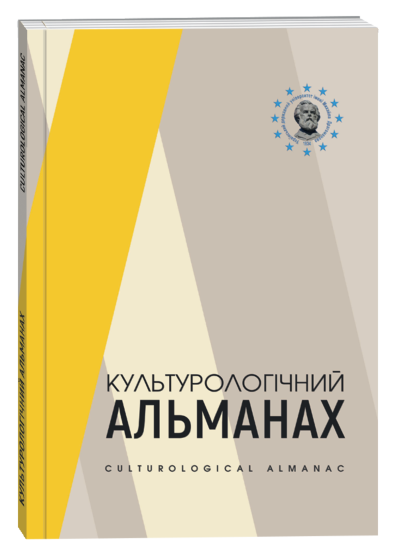THE RELATIONSHIP OF TELEVISION, CULTURE AND SOCIETY: CULTURAL STUDIES ANALYSIS OF FOREIGN DISCOURSE
DOI:
https://doi.org/10.31392/cult.alm.2023.2.35Keywords:
television, culture, society, mass media, sociocultural phenomenon, cultural values.Abstract
The article notes the importance of television as a unique institution, an inseparable part of the sociocultural life of modern society, as a factor in a radical turn in its functioning, as a powerful tool for the transmission of cultural values and the formation of public opinion. It is emphasized that it is cultural studies that make a decisive contribution to thinking about how culture, society and everyday practice are inextricably linked and can be problematized through the means of communication – in particular, television. The concepts of representatives of different scientific schools and directions in the study of media, television, and its relationship with culture and society as a whole are considered. In particular, R. Williams, who defines television as a phenomenon interconnected by three important processes: technological, institutional and cultural, and offers two approaches to the study of television: from the point of view of its technologies; as a form of cultural expression. Attention is drawn to the belief of E. Antunes and P. B. Vaz that concepts based on technological aspects significantly limit the study of television as one of the types of new media; in fact, television plays an important role in the mediation of cultural and ideological values thanks to such genres., like news, movies, TV series, etc. It is found that Martin-Barbero views television as a way of interpreting the world, proposing the concept of mediation, focusing on temporal aspects and the multiplicity of cultural matrices. In turn, S. Goll emphasized the importance of the social and cultural context, proposing to consider the practice of reviewing television as a process of negotiation between the viewer and the text, as a type of discursive conflict. The need to pay special attention to the connection between television consumption and cultural capital, which is an important predictor of television consumption patterns, is indicated. It is noted that the changes taking place in viewer habits are dynamically related to technology and to the television industry itself; this is a transitional moment when the industry is trying to find ways and solutions to remain profitable and attractive to the viewer. The reconfiguration of the television industry has been stated, giving way to torrents and streaming on the Internet – in fact, television has configured itself as an important agent in which the cultural practices of modern society are intertwined. Audienceconstructed practices forced the television industry to rethink itself, providing evidence of shifting hegemonic and counter-hegemonic notions of what could be considered “television.”
References
Білоус, О. (2018). Принципи діяльності телебачення у контексті пропагування українських національно- духовних цінностей. Теле- та радіожурналістика. Вип. 17. С. 79–82.
Борис, Л. (2020). Український телепростір періоду незалежності. Теле- та радіожурналістика. Вип. 19. С. 131–138.
Доброва, С. (2015). Новітні підходи у вивченні інтернет-телебачення. Теле- та радiожурналiстика. № 15. С. 162–167.
Климанська, Л. Д., Луцишин, Г.І. (2022). Практики споживання контенту медіа в сучасному інформаційному суспільстві і формування громадянської культури. Перспективи. Соціально-політичний журнал. № 2. С. 166–177.
Корнєєв В. М., Хилько М. М. (2014). Вплив контенту засобів масової комунікації на український соціум. Актуальні питання масової комунікації. Вип. 16. С. 57–68.
Лизанчук, В. (2020). Телебачення і радіомовлення в інформаційно-гуманітарному просторі України. Теле- та радіожурналістика. 2020. Вип. 19. С. 44–77.
Літвінова, Ю. М. (2006). Телебачення як соціокультурний феномен. Український соціум. 6(17): 39-45 https://doi.org/10.15407/socium2006.06.039 (дата звернення: 17.06.2023)
Літінська, Н. (2019. Телебачення як інструмент трансформації свідомості сучасної людини. Грані. Т. 2 2. № 6. С. 31–41.
Федорчук, Л. (2018). Телевізійна аудиторія: нові концепції і технології дослідження. Теле- та радіожурналістика. 2018. Вип. 17. С. 64–70.
Цімох Н. І, Гнатюк А. В. (2023). Телебачення як соціокультурний феномен і предмет культурологічного дослідження. Культурологічний альманах. № 1. С. 238–243.
Чорна, К. В. (2015). Використання жанру інфотейнмент в українських теленовинах, пошук нових засобів і прийомів гри та розваги в інформаційних програмах. Вісник Київського національного університету культури і мистецтв. Мистецтвознавство. Вип. 32. С. 148–155. 12. Шальман, Т. М.(2015). Інформаційний простір: сутність і місія комерційного телебачення в ньому. Інформаційне суспільство. № 21. С. 12–18.
Antunes, E., & Vaz, P. B. (2006). Mídia: um aro, um halo e um elo. Na mídia, na rua: narrativas do cotidiano. Belo Horizonte: Autêntica, 43–60.
Hall, S. (2007). Encoding and decoding in the television discourse. In CCCS selected working papers (pp. 402-414). Routledge.
Horkheimer M. (1976). Traditional and Critical Theory. In P. Connerton (Ed.). Critical Sociology: Selected Readings. Harmondsworth: Penguin. 1976. . 206–224.
Martin-Barbero J. (1993). Communication, Culture and Hegemony: From the Media to Mediations (Communication and Human Values series). London : SAGE Publications, 272 р.
Rusakow, S. (2015). Modern Television Series as a Phenomenon of Popular Culture. Studia Warmińskie, 52(52), 85–94.
Williams R. (2003). Television: technology and cultural form. London : Routledge.
Williams, R. (2003). The technology and the society. Television: Critical concepts and cultural studies, 2, 42-57.








